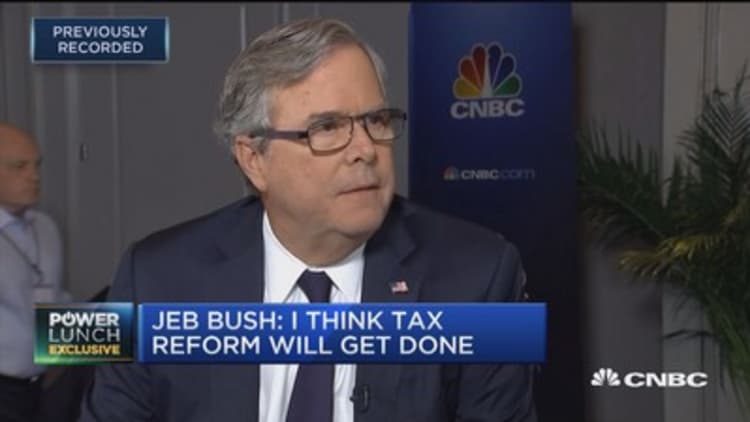
Former Florida Gov. Jeb Bush on Monday said it would be "stupid" for Republicans to pass only temporary tax cuts.
Lower tax rates, part of the GOP push to overhaul the American tax system this year, may have to last only for a few years to comply with Senate rules.
"That is really stupid because it creates uncertainty," Bush, a 2016 presidential candidate, told CNBC's "Power Lunch" in Florida. "The Byrd Rule should be modified. If you want to create long-term economic growth, you've got to think beyond 10 years in my mind. So maybe — I mean, the rule's not going to change. But it does create a real problem."
Under Senate rules Republicans aim to use to approve a tax-reform plan, a bill cannot increase budget deficits after 10 years. The current congressional GOP proposals to chop corporate and household taxes are projected to significantly expand deficits.
To stay within the rules, Republicans may have to consider changes, like adding more provisions to raise revenue or making tax cuts expire within the decade.
Bush on Monday said a lack of consistent policy could discourage business actions that would boost job opportunities and wages.
"We're very short-term oriented in how we go about business these days and the net effect is we're not training people and we're not creating higher wage jobs. And income has really lagged behind," he added.
House Republicans aim to pass their tax plan this week. The Senate starts marking up, or debating and amending, a slightly different tax proposal on Monday afternoon.
If the chambers approve separate bills, they will have to reconcile the plans before passing unified legislation.
The Congressional Budget Office projected that an earlier version of the House plan would add $1.7 trillion to budget deficits over 10 years.
The plans would get rid of some deductions and other measures to offset the tax cuts. But the plans are not expected to fully cancel out the lost revenue with other money-raising measures.
Many Republicans argue that economic growth sparked by the tax changes will either largely or fully make up for the cuts.


